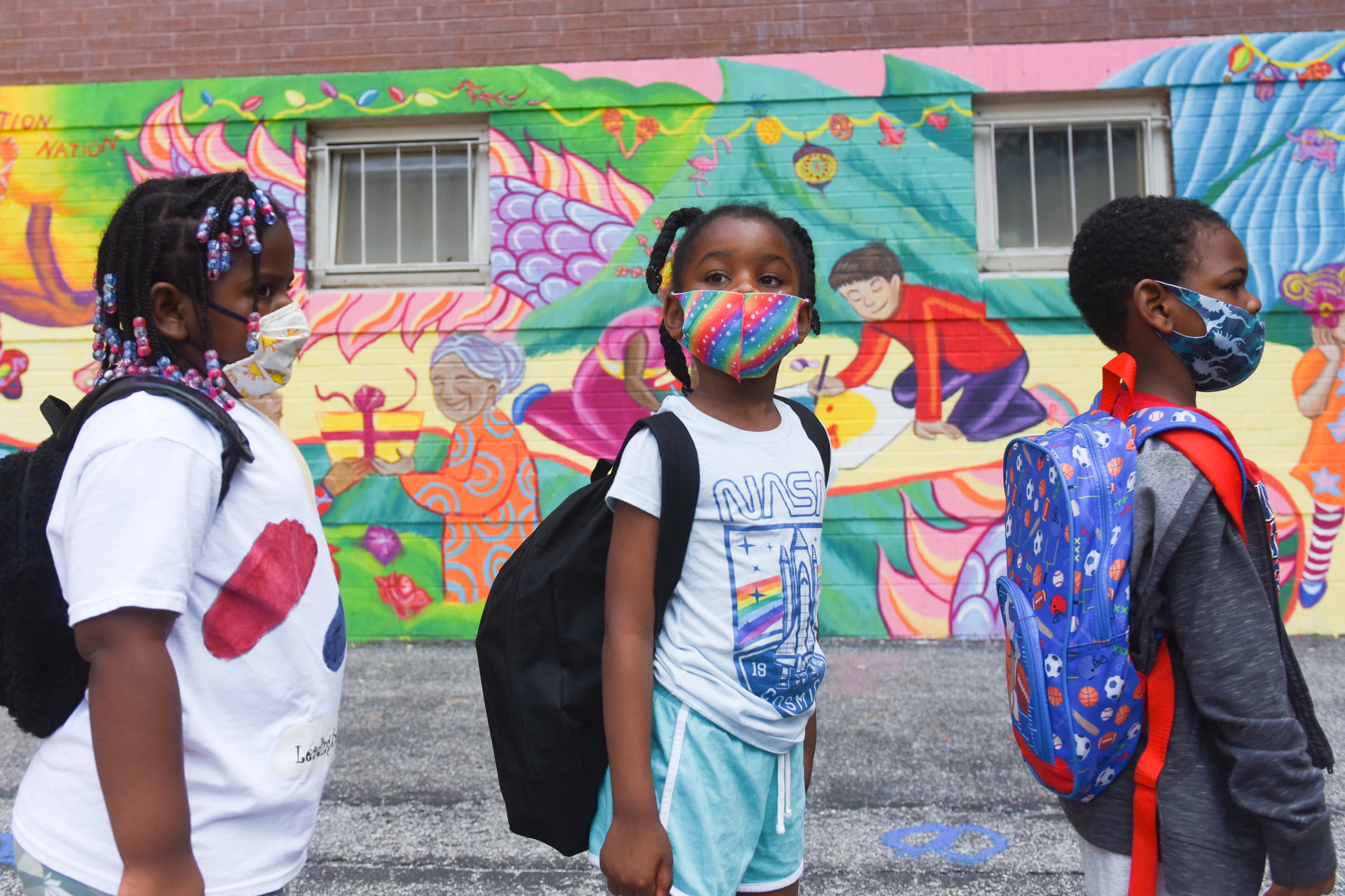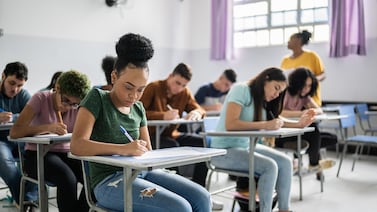Sign up for Chalkbeat New York’s free daily newsletter to keep up with NYC’s public schools.
Applications for New York City’s free summer programming opened Monday to all children in kindergarten through eighth grade.
But in the wake of budget cuts ordered by Mayor Eric Adams, middle schoolers will face significantly fewer hours of enrichment programming this summer.
Launched in 2021 with federal pandemic relief funding, the Summer Rising program was designed to help students readjust to in-person learning and expand summer school opportunities beyond children who were traditionally mandated to attend. The initiative includes a mix of academic instruction provided by Education Department teachers and enrichment activities supported by a network of community-based organizations.
Summer Rising will once again include up to 110,000 slots — and is open to all New York City children currently enrolled in grades K-8, including those who attend charter or private schools.
But there will be a few changes this year. The application process is starting about a month earlier, with placements announced in mid-April, to give caregivers more time to plan for the summer and arrange child care if necessary. And families will now apply using MySchools, the sometimes glitchy website that manages the public school application process from prekindergarten through high school.
The most significant change, however, concerns reduced hours for middle school students.
Here’s what you should know about this year’s Summer Rising program:
How does the Summer Rising 2024 application work?
Using the MySchools portal, families can rank as many different Summer Rising sites as they want — choosing from roughly 360 options across the five boroughs. The seats are not issued on a first-come, first-served basis, so families can apply any time until March 25.
In line with the admissions policy last year, some students will receive priority for summer slots. That includes certain children with disabilities, those who live in temporary housing or foster care, children who are behind academically, and students applying for Summer Rising sites that are housed in their regular school.
What is the schedule for Summer Rising, and when does it start?
For students in grades K-5, Summer Rising operates 8 a.m. to 6 p.m. from July 2 to Aug. 16.
For middle schoolers, Summer Rising will run from 8 a.m. to 4 p.m. — two fewer hours — and will no longer operate at all on Fridays. The program for those children runs from July 2 to Aug. 8.
Some students with disabilities are entitled to year-round schooling and those programs operate during slightly different times. Children who attend schools in districts 1-32 generally attend summer classes from 8 a.m. to 2 p.m. from July 2 to Aug. 12. Those who attend District 75 schools, which are for children with more significant needs, will attend 8 a.m. to 2:30 p.m. from July 3 to Aug. 13.
And those who attend programs for students with autism — including Nest and Horizon — attend 8 a.m. to noon from July 2 to Aug. 8.
Students with disabilities who attend school year-round have the option to attend the extended day enrichment programs operated by community organizations that run until 6 p.m. (or 4 p.m. for middle school). Interested families must apply through MySchools and students with disabilities in the categories listed above will receive priority for seats.
Why are there fewer hours for middle schoolers?
Summer Rising is one of a slew of programs initially funded with federal pandemic relief money that is now running out, forcing city officials to either find new funding to replace those expiring dollars or make cuts.
So far, Adams has done a bit of both. The mayor chose to keep the Education Department’s contribution to the program, which helps fund the academic portion of the day, using about $80 million in city money to replace federal dollars.
But the afternoon enrichment portion of the program is funded by a different city agency — the Department of Youth and Community Development. Adams cut $20 million of DYCD’s roughly $149 million contribution to Summer Rising, forcing reductions in programming for middle school children.
Some advocates worry that fewer hours, and the elimination of Fridays, will make the program less popular and hurt its quality.
“Friday was usually when they did field trips and things outside of the school building,” said Nora Moran, the director of policy and advocacy at United Neighborhood Houses, which represents community organizations that operate some of the city’s summer programming. She emphasized that community organizations are able to quickly restore hours if the city makes additional funding available.
“We’re certainly hopeful the mayor reverses his decision to shorten the program day,” she said.
How popular is Summer Rising in NYC?
In a city with few affordable child care options, Summer Rising has been quite popular. Last year, there were about 45,000 more applicants than available slots, officials said (though some of those children eventually won a seat).
Students generally spend their mornings on academic work and in the afternoon participate in enrichment activities, including art, science projects, and trips to cultural institutions. For elementary school children, the final week of the program is dedicated to enrichment activities and trips operated by community organizations.
Many parents have praised the program, noting it gives their children something to do other than expensive camps, watching TV, or spending countless hours scrolling the internet. But others have been disappointed and even pulled their children, citing boring assignments during the academic portion of the day, limited time outside, and few opportunities for field trips.
Here’s what parents told us about their Summer Rising experience last year.
What about students with higher needs?
Students with disabilities are supposed to continue receiving the services they need to access summer programming, such as health and behavioral paraprofessionals, and their schools must devise a “Summer Rising Accommodation Plan” before the program begins.
Still, not all services are available for the afternoon enrichment programming — such as paraprofessionals who help manage student behavior — and community organizations are instructed to provide support “as needed.” In practice, some advocates said community organizations aren’t always well-equipped to serve students with special needs, leaving some families to avoid the program entirely.
“The community based-organizations don’t necessarily have the knowledge, and skill, and staff to help support students with behavioral needs,” said Maggie Moroff, a senior policy coordinator at Advocates for Children, which helps students with disabilities navigate the special education system. “A plan from the school that is supposed to be put in place by the [community organization] leaves a whole lot of room for mistakes.”
Officials also noted that English learners will receive “instruction targeting language and literacy development to support them with grade-level content” during the morning sessions, including in small groups or one on one.
What’s the transportation situation?
Students who already receive yellow school bus service during the school year should generally receive bus transportation for Summer Rising. And students with MetroCards during the school year will continue to receive them for the summer.
But for students who ride the bus, there’s a catch: The city’s yellow bus service stops rolling at 3 p.m., so students who participate in the extended enrichment portion of the day until 6 p.m. (or 4 p.m. in middle school) will instead have access to a prepaid rideshare service.
A caregiver must accompany their child in the rideshare to and from the summer school site, which some advocates have criticized as inaccessible for working families who don’t have time to ride to and from a Summer Rising site at the end of the day.
“I think a lot of families opted to forgo the opportunity because they didn’t have a way of getting their child back home,” Moroff said.
Alex Zimmerman is a reporter for Chalkbeat New York, covering NYC public schools. Contact Alex at azimmerman@chalkbeat.org.







